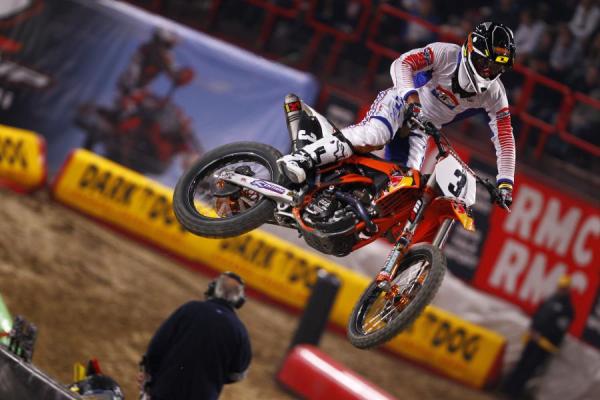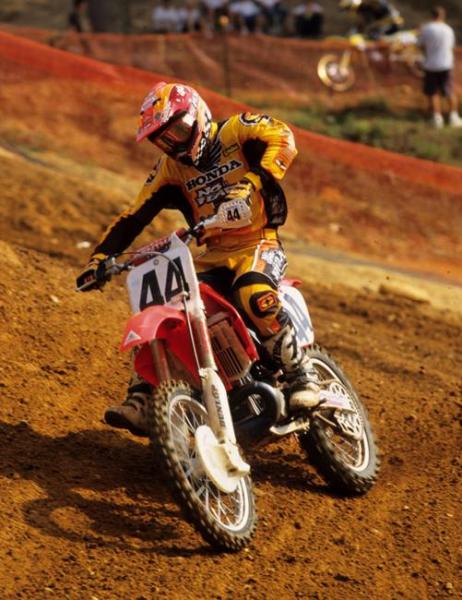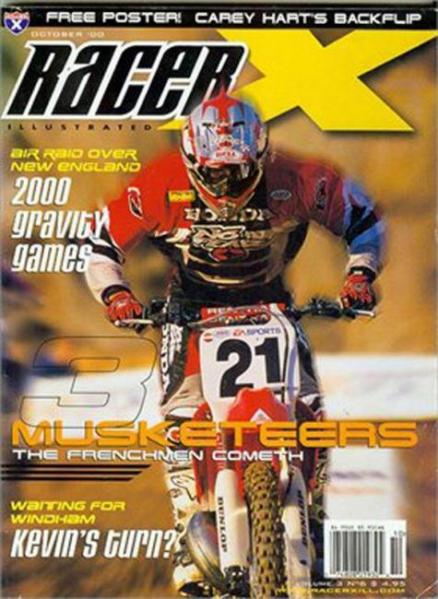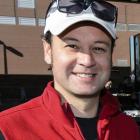Sebastien Tortelli arrived to the USA as a two-time World Champ in 1998. He promptly won his very first 250cc supercross, which came as a shock to the entire motocross world. In 1999, Tortelli won again, this time going 1-1 to win the very first outdoor national race of the season.
Tortelli’s career lasted another ten years, but the French rider struggled with injury after injury, and was never able to transition his speed and experience into a title in the U.S. Tortelli retired in 2006 on his own terms, and has not ventured from his roots.
Racer X: Hey Seb, what’s going on? I know you are doing some schools and maybe promoting a race in Mexico as well, but I am curious to know what you have been up to recently, and what is going on in your life.
Sebastien Tortelli: Yeah, hey thanks. Well first, there are a lot of people who thought I went back to France after I retired, which actually is not true. I never did that. I moved here to the USA in 1998, and have not left!
Well, I think people think that because you went back and raced a year in the GP’s toward the end of your career, right?
Yeah, I raced six months there in 2006 and then retired. So that’s the first thing. Except that then I went through the experience with Perris Raceway. After that, I moved on to the Champ Factory, which was the main thing I started with after I retired. You know, Perris was just a way to reward our riders, and to get the school out there. But too many things happened and it was not possible. So basically, I’ve been focusing and growing the school. That’s my number one activity that I’ve been doing and it’s been going good and has been growing. I am very excited for it, and that has been my number one focus.
Then, on the other hand, I’m also working with JT. I’m helping them out as much as possible. When they came out I was one of their first riders last year, and have been doing some testing a little bit.
I am also still involved with KTM. I’m doing some testing for them once in a while on product development, and I am still in the family, so to speak. So I get to ride the KTM 350, which is a really cool bike.
Lastly, I am working on promoting the GP race in Mexico, which we’ll have next year, in May. So that’s my number one priority for May. It’s going to take a while to build everything up and get it working, but we already have experience from last year, where we had the celebrity race with Dubach, myself, and Everts. So that was kind of a first organization out there in Mexico. Then the GP will be our first worl- wide organization.

Tortelli is still part of the KTM family, as well as JT Racing.
Photo: Racer X Archives
And where in Mexico is it?
It’s going to be in Caratoul area, which is between Guadalajara and Mexico City. So that’s where it is. We have three different locations which we are working on finalizing right now. I think there are international flights right to Caratoul, so that should help.
Going back to your personal thing, you’re living in San Diego, right?
Yes. I live full-time in San Diego. My kids go to a French American school there. That’s the reason why I moved, to make a life in San Diego. And so that’s where I stay full-time, but I’m every day in the area of a track, between, you know, like Pala, or Milestone and Glen Helen. So, for me, I am mainly doing just more projects, you know. Trying to do things step by step.
Tell me a little bit about the school and what differentiates it?
My school is mainly for international guys. I have guys from Chile, Australia and Switzerland. So it’s a lot of European guys or international guys. This year I’ve got six guys that I’m training, so that’s the main focus. We’re training four times a week. It’s from Monday through Friday. We’re training and doing the physical, mental and riding portions as much as possible.
And where are the guys living? Do they all live with you?
(Laughs) No, they live in either Riverside or Corona. They have houses that they rent out or I help them find lodging and all of that stuff. So I work with them on making the best way here to the States, and to help them for getting their visas while they are training here in California.

Tortelli had a ton of success in the U.S., but was never able to bring home a title.
Photo: Racer X Archives
So in some ways, if I remember correctly, from some of the old media-–you were in a motocross program similar in France, right?
Yes, exactly. Actually, I was helped by the French Federation, the Youth Federation when I was 12. And they had kind of the same program, but that was a little bit different where we only had coaching during the school holidays. You know, we got together like three or four times a year. I was able to graduate and go onto different classes until I turned 16, which was when I started doing the World Championship. Then I was on my own, but with the support of the Federation to be able to follow my scholarships.
Who else was in that program with you?
Roncada and Vuillemin were also part of that program. And today, guys like the Pourcel brothers were also in it. So basically, the French Federation has a really solid program for helping kids with talent. And actually, I have a couple of projects like that with South America. There are a couple of countries out there that really want to help their level of riders to grow up.
Cool stuff! It sounds like you have a lot going on. But one last question--I do a lot of these interviews, it seems like some of the guys have problems after they quit; they get in trouble after their careers are over and they go down the wrong path.
Yeah. I’d say it seems like more of them have problems than don’t have problems.

Tortelli on the cover of Racer X Illustrated.
Yep. But in speaking to you it seems clear that you are very focused.
Well, I was always a very dedicated rider, so basically I stopped early. I mean I stopped when I was young. I was 28 when I retired. It was a decision I made on my own terms. Even if I had--actually, KTM had me in a contract for another year and I was like, “You know, guys, listen, I got hurt. I don’t feel like I can. In my mind right now I’m not ready to give 100 percent.” So I made my own choice to retire. It was, you know, not like, “Okay, I’m going to do an x-ray, we won't know right or wrong, and get a paycheck." That’s not who I was, you know? If I was not a 100 percent rider I was not racing. So when I retired, you know, that was pretty abrupt and so knowing that I went also to school a long time, until I was 18, having some education, when I retired I was like, okay, sport is what I love to do. What can I do to stay into it? I looked around a little bit before I went in this direction. I passed my real estate license. I tried a few different things, but everything came back to motocross. My life is about motocross.
To me it was a natural path because I love the sport and that’s what I like to do. Still to this day, I need to ride. If I don’t ride at least once or twice every week or every other week my body starts aching and I’m like out of it. I’m like, “Come on. I need to get my drug back!” So, like I say, you know, the drug is riding. I’ve been doing it since I’m five and I cannot get away from it.
It also helps having a good family around me. I mean I’ve been married for 12 years now, and we have two kids. I’m a happy man where I’m at and that is, to me, my number one reason to be and to perform at what I do. That's all I need now that my career is over. I have two little kids. I have a wife. That’s where my life is.




